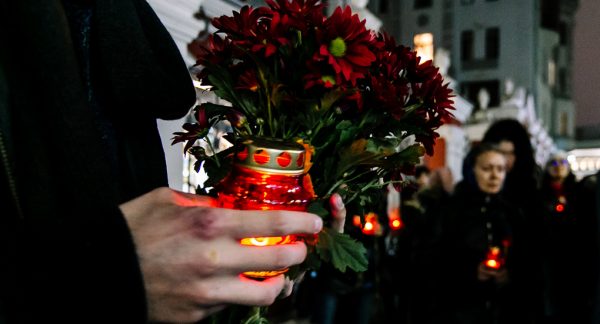The following material was prepared by Foma.

Alexander Tkachenko
Living in today’s information universe, we learn about one’s tragedy instantly and in detail. It can be a tragedy of a stranger you learned about in news, or of someone you know personally, but not close enough to have a true emotional contact. Although sometimes we wish to do something about it, we have absolutely no idea what. Thus we bring candles and flowers to a tragedy site, but cannot help feeling that… it is not enough. Can one truly share the pain of another person, especially if their grief is for their lost child? We have asked a psychologist and a regular author of Foma journal, Alexander Tkachenko, to answer this question.
How do you help people who do not want to eat, sleep, think, live, having lost a beloved one?.. having lost a child?..
Psychology specialists can help in this situation the most. However, if such person ends up near you (yourself being not a psychologist whatsoever), there is a time-proved method described in the New Testament: …weep with those who weep (Romans 12:15). Truth be told, every one of us helps their close ones psychologically one way or another. We console each other, try to support those in need, say and do something for it. Such help may come in different shapes, but the most necessary condition is genuine sympathy towards the other person’s trouble.
In order to help you should take on part of someone else’s pain, feel it as your own, weep with that who weeps, not just “for company”, but because you have truly joined them in their grief, accepted it as your own and now you are too in pain from it.
It is difficult and not everyone can do it, but without that genuine participation, help of any sort is out of question.
Losing a child is the most terrible grief for a mother. Anyone who wants to help her in this situation should clearly understand that they will have to accept part of that unbearable misery in their hearts, will have to cry, and will have to participate in her suffering. In other words, co-suffer. If you lack such commitment, but are willing to help, it is better just to pray for the victims, to ask the Lord to send them consolation, relief and spiritual strength. Prayer is also help.
Is there any chance for consolation? What should it be: reading the Bible or taking part in the Sacraments?
The only people who have a right to give advice to people who have lost the dearest to them are those who have survived a similar tragedy and found consolation in something, for example in reading the Bible or in the Sacraments. I have no such experience and thus cannot say anything. In my opinion, words are not as needed here as personal participation. Talking is not as essential as listening, absorbing what you heard, and just being near the person. So that they could cry on your shoulder and know that you will not say smart things, but rather cry together with them.
But advising something like this from afar, from the outside is, in my opinion, very dubious.
Can an ordinary priest console anyone in such a grief?
An “ordinary” one hardly can. However, an experienced, thoughtful, capable of empathy one, yes, he can. The New Testament has fascinating words: …the Father of mercies and the God of all comfort, who comforts us in all our tribulation, that we may be able to comfort those in any trouble, by the comfort wherewith we ourselves are comforted of God. (2 Corinthians 1:3-4). A very important message is given here: it turns out that the only one who has experienced sorrow and received comfort from God, can now share this comfort with others who are grieving. If a priest has such personal experience of sorrow and consolation, he is able to console others as well. Such priest will find places in the Bible which can help to overcome sorrow, and will properly prepare a person for the Sacraments.
Priesthood itself does not make a person capable of helping in such misfortunes. It does not come immediately and not to everyone.
Why does God take children away? What can one rely on after such a loss?
That is a weird way to put it. Here God is likened to officials from the child protective services, who take children away from their parents for whatever reasons, which one can review and appeal against in case of unjust decision. But where in the Gospel do we see Christ taking away children from their parents? Quite the opposite, He returns the daughter, taken away by death, to a synagogue leader Jairus, resurrects this twelve-year old girl; brings back to life the deceased son of the widow of Nain.
Not God, but death takes children away. The Holy Scriptures directly name death the enemy of Christ: The last enemy to be destroyed is death (1 Corinthians 15-26).
To be brief, death has entered the world through sin, that is through man’s voluntary deviation from good. Therefore, when children die today, it would be naïve to blame God for their deaths. Children are not killed by God, but by adults’ malice, their irresponsibility, indifference, disregard for their duties, and hardness of heart. In some cases God protects children from the consequences of grown-ups’ sinful conduct and averts disasters that are about to occur, but in other cases He does not. The reason is yet unknown to us. But it is not God who takes children away from their parents. One should know it and firmly believe it. Otherwise, one may deprive oneself of the last support and consolation in one’s grief. If one perceives God as an enemy who takes children away, whom can you complain about Him, who can protect you from Him? Such way of thinking is a direct path to madness.
In their afterlife deceased children, says one of the most respected fathers of our Church Venerable Ephraim the Syrian, are even more glorified in God than the saints:
“Praise be to Thee, our Lord, from the lips of infants and children who, like pure lambs in Eden, prosper in the Kingdom! For said the Holy Spirit (Ezekiel, 34:14), they grazed among the trees, and Archangel Gabriel is the shepherd of these flocks. Higher and lovelier are they than virgins and saints. They are God’s children, pupils of the Holy Spirit. They are the accomplices of the Heavenly, friends of Sons of Light, inhabitants of the pure land, far from the land of damnation. The day they hear the voice of the Son of God, their bones will rejoice, freedom will bow its head, which has not yet perturbed their spirit. Short were their days on Earth; yet guarded their lives are in Eden, and most desired it is for their parents to get to their abode.”
A believer does in fact perceive death differently from an atheist. Where an atheist sees a complete and absolute end of existence, for a Christian through their faith the light of a new life is revealed, far better than earthly. A modern theologian Alexey I. Osipov describes it as such, “Imagine this: in winter, in the mountains, during a storm, a group of people has got lost, and among those people are a mother and her son. They follow the path with a constant threat to their lives. It is unknown how long and how they will have to keep on this path. Suddenly, a helicopter approaches, lands, and a crew commander says he is headed the same way the group is headed and that there is room for one. Would not the mother do everything in her power to have her son taken, for him to be saved?
That very thing happens in human life, when a “helicopter” takes our dear ones and brings them home, while we are still on our way, not knowing what we will encounter: what kind of sorrows, diseases, tragedies, and what kind of decease. Christianity claims that a man on Earth is a mere wanderer: an earthly life is just a way home and death is just a brief separation. Soon we will all meet in our home. Therefore the Apostle said, “For here we have no continuing city, but we seek one to come” (Hebr. 13:14). Only may God grant us a meeting with our relatives there not overshadowed by our bad deeds, but rather happy and joyful.”
How can one continue to live, rejoice, be grateful, if one has a grudge against God in one’s heart, if one reproaches Him inside for cruelty and injustice?
You cannot. Having a grudge in your heart, it is impossible to be joyful at all. Having a grudge against God, it is even more so. It is a dead end, no matter how great the sorrow is.
Only having overcome the grudge can one find joy in life. When we hold a grudge against someone close to us, the easiest way to keep the grudge forever is to stop all communication with them. When, however, we wish to reconcile, forgive them and live further without this thorn in our heart, we come to them and say, “You have offended me, but I do not want to end our relationship. Let us decide how to live on”. Very often in such conversation it turns out the person has never actually wanted to hurt you, that you are also dear to them and they are ready to do everything for you to be together again. Many people have probably had such experience.
Things are pretty much the same in a situation when one holds a grudge against God. If you want to stay with this grudge forever and bring yourself to illness, madness or suicide, break up with God once and for all, consider Him to be a cruel tyrant and an executioner.
But if you want to return the joy of life, turn to Him in prayer. Tell God everything that weighs heavy on you: tell Him all your pain, get outraged, reprimand Him for it, but only do not break up with Him, do not turn away from Him.
After all, the righteous Job behaved exactly the same when his children died and he himself lost everything he had, “Know now that God has overthrown me and has compassed me with His net. Behold, I cry, out of wrong, but I am not heard: I cry aloud, but there is no judgment. He has fenced up my way that I cannot pass, and He has set darkness in my paths. He has stripped me of my glory, and taken the crown from my head. He has destroyed me on every side, and I am gone: and mine hope has He removed like a tree” (Job 19:6-10). May your prayer be with anger and resentment, but it still connects you with God. Do not tear this thread, and then, God will be able to pull you out of this dreadful condition. Venerable John of Damascus said, “Praying is the raising of one’s mind and heart to God or the requesting of good things from God”. Should we really consider such questions improper: why did a child die, who was the main joy of one’s life, or how should one live further with this loss?
It seems to me that one should definitely turn to God, even with a grudge in their heart. After all, only those who ask can get an answer.
Translated by Kirill Nikolaev

















